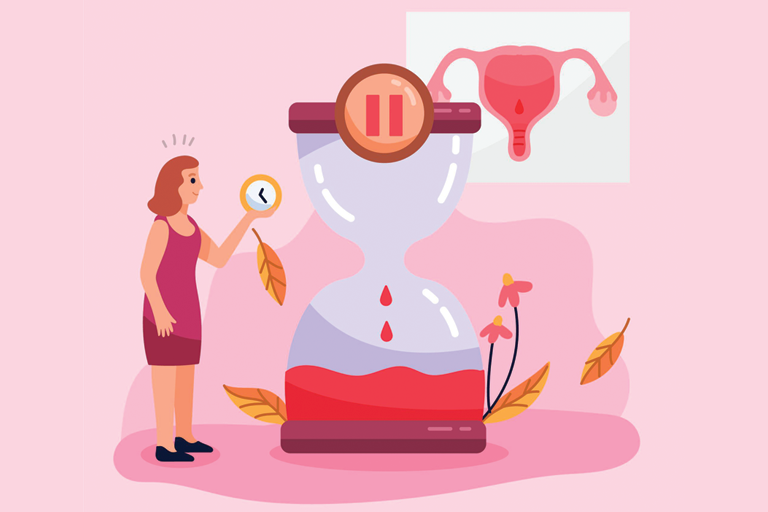Is Your Period Normal? Here’s How to Know What’s Okay—and What’s Not
“Periods are monthly, right?”
Well… not always. And even when they are, the how, when, and how much can say a lot about your overall health.
As a gynaecologist in Hyderabad, I often hear questions like:
- Is it normal to skip a period sometimes?
- Should I worry about heavy bleeding?
- What if my periods are very painful?
Understanding your menstrual cycle is one of the most powerful tools you have in managing your reproductive and hormonal health. In this blog, we’ll break down what a "normal" period looks like, the common signs of irregularities, and when it’s time to see your doctor.
What Is a Normal Period?
A "normal" menstrual cycle can vary from person to person, but in general:
- Cycle length: 21 to 35 days
- Bleeding duration: 2 to 7 days
- Flow: Total blood loss of 30–80 ml (around 2–6 tablespoons)
- Symptoms: Mild cramping, slight mood changes, breast tenderness
If your periods fall within this range and come regularly, that’s a good sign that your hormones and reproductive system are functioning well.
When Is a Period Considered Irregular?
Irregular periods occur when your cycle falls outside the typical 21–35 day window or changes unpredictably. It might include:
- Skipping months without being pregnant
- Bleeding more than once a month
- Periods that are extremely light or unusually heavy
Common causes include:
- Polycystic Ovary Syndrome (PCOS)
- Thyroid disorders
- Stress or significant weight changes
- Perimenopause (in women over 40)
- Chronic illnesses or medications
How Much Bleeding Is Too Much?
Heavy menstrual bleeding—also known as menorrhagia—can interfere with daily life and may indicate an underlying issue.
Signs of excessive bleeding:
- Soaking through one or more pads/tampons every hour for several hours
- Bleeding for more than 7 days
- Passing large blood clots
- Feeling tired or dizzy (possible anemia)
Possible causes:
- Uterine fibroids
- Endometriosis
- PCOS
- Hormonal imbalances
- Certain birth control methods
If you're experiencing this, it's important to see a gynaecologist for a diagnosis and treatment options.
How Painful Is Too Painful?
Mild cramping is normal during your period. But if the pain:
- Starts days before bleeding
- Interferes with daily activities
- Doesn’t respond to over-the-counter medication
- Comes with nausea or bowel changes
It may be a sign of something more serious, such as:
- Endometriosis
- Adenomyosis
- Pelvic inflammatory disease
- PCOS
Chronic period pain should never be ignored. The earlier you seek help, the better your treatment outcomes.
Painful periods, endometriosis, period pain relief, women's health
When Should You See a Doctor?
Here’s when to stop guessing and book an appointment:
✅ You’re missing periods for more than 2 months
✅ Your cycle is less than 21 or more than 35 days
✅ You’re bleeding heavily or for longer than a week
✅ You have severe cramps or pelvic pain
✅ You’re trying to conceive and facing irregular cycles
As a fertility doctor at Nova IVF in Banjara Hills, I see many women who only realize their cycle irregularities when they're trying to get pregnant. But the truth is—your period health reflects your overall reproductive health. Early attention to irregularities can improve fertility outcomes later.
Fertility doctor Hyderabad, Dr Durga Vytla, Nova IVF, Banjara Hills doctor
How to Track Your Period for Better Health
Start by tracking your cycles using a calendar or an app. Record:
- Start and end dates
- Flow intensity
- Symptoms (cramps, mood swings, fatigue)
- Any spotting or unusual bleeding
This record helps both you and your doctor better understand what's going on and spot patterns over time.
Final Thoughts: Know Your Cycle, Own Your Health
Your menstrual cycle is a monthly report card from your body. Learning to read it gives you control, confidence, and clarity about your reproductive and hormonal well-being.
So, when is a period worth worrying about?
When it's too late, too early, too heavy, or too painful.
If something feels off, don’t brush it aside. A simple consultation can go a long way in preventing complications and supporting your future fertility.
Watch my quick video where I explain more about what’s normal and what’s not—and help you decide when to relax and when to reach out. 🔗 [Watch Out More]
#Periods #MenstrualHealth #WomenHealth #FertilityDoctor #DrDurgaVytla
#GynaecologistHyderabad #KnowYourCycle #PCOSAwareness #IrregularPeriods
#PainfulPeriods #NovaIVF #BanjaraHillsDoctor

